HS2 'could cost taxpayer £80bn'
- Published
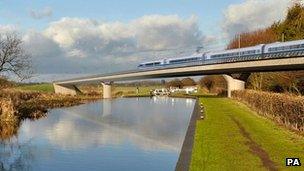
The government says HS2 will bring "billions of pounds worth of economic benefits"
The HS2 high-speed rail project could cost more than £80bn - almost double the current estimated cost of £42.6bn, a free-market think tank has said.
The Institute for Economic Affairs (IEA) expects lobbying by local councils for extra infrastructure and design changes will inflate the cost.
It wants HS2 to be scrapped and the money spent on other transport schemes.
The company behind HS2 said the scheme would create an "economic asset" and provided "significant value".
HS2, which stands for High-Speed 2, is intended to allow trains to run at 250mph (400km/h) from London to Birmingham from 2026, with branches to Manchester and Leeds via Sheffield planned by 2032.
Opponents say the scheme will cause an unacceptable level of environmental damage, loss of homes and disruption to many communities.
The IEA said in its report, to be released on Monday, that the cost of new trains would be £7.5bn.
And it said changes to the route "to keep voters on side" were likely to add another £30bn to the current estimated cost of £42.6bn, which includes "contingency" money.
That £30bn, it said, would come from areas including:
New road links, tram lines and road upgrades to cope with more pressure on infrastructure along the route
Extra tunnels and other design changes "to buy off opposition"
Regeneration schemes around new stations as well as in towns bypassed by the line
The report said HS2 "and the add-on transport schemes will be heavily loss-making in commercial terms - hence the requirement for massive taxpayer support".
Author Dr Richard Wellings said it was now "time the government abandoned its plans to proceed with HS2"
"The evidence is now overwhelming that this will be unbelievably costly to the taxpayer while delivering incredibly poor value for money," he said.
"It's shameful that at a time of such financial difficulty for many families, the government is caving in to lobbying from businesses, local councils and self-interested politicians more concerned with winning votes than governing in the national interest."
The institute said the policy may have been partly followed to win votes in "response to poor electoral performance in the north of England in recent elections".
And it said money would be better spent on more "commercially viable" road, rail and transport projects "not requiring support from the taxpayer".
Sue Holden, chief executive of the Woodland Trust conservation charity, said the IEA report brought the potential environmental damage from the HS2 project into "sharper focus".
"As.... the business case weakens... it is imperative the government fully considers the impact HS2 will have on the environment across the UK in the long term," she said.
'Absolutely vital'
But Emma Antrobus, of the Greater Manchester Chamber of Commerce, said the UK was "suffering from decades of under-investment" in transport infrastructure.
She said building HS2 would improve connections between cities and "free up enormous amounts of capacity on the current rail network" for passengers and freight.

An artist's impression of the proposed HS2 station at Old Oak Common
She accepted the costs of HS2 had risen but suggested IEA's estimate was too high.
A Department for Transport spokesman said: "HS2 is absolutely vital for this country, providing a huge economic boost which will generate a return on investment that will continue paying back for generations to come.
"Without it, the key rail routes connecting London, the Midlands and the North will be overwhelmed.
"HS2 will provide the capacity needed in a way that will generate hundreds of thousands of jobs and billions of pounds worth of economic benefits.
"The government is committed to managing the cost within the budget we have set for the project and to securing maximum value for money for the taxpayer, while also ensuring that preparations are properly made for the most significant infrastructure investment the UK has seen in modern times."
The government has so far only set a target cost for the London-Birmingham section of the scheme and HS2 Ltd said it was focused on delivering the project's first phase within its £17.16bn limit.
A spokesman said the IEA's "approach has clearly been designed to suit their aims and those of their funders to dismiss any major government project".
He added: "HS2 is an engine for growth that provides significant value for money and will create a transformational national economic asset from which the whole of the UK will benefit for years to come."
Last month, the latest legal challenge to HS2 - from objectors including residents' groups and 15 councils along the route who had asked judges to order a further assessment of the scheme as a whole - was rejected by the Court of Appeal.
Judges dismissed all seven grounds of challenge against the London-Birmingham section of HS2, but a final appeal to the Supreme Court will be allowed.
That led transport minister Simon Burns to say Parliament was "the right place to debate the merits of HS2, not the law courts", adding the government would introduce "the hybrid bill for phase one before the year is out".
The government would continue with the "crucial business" of getting HS2 ready for construction in 2017, he added.
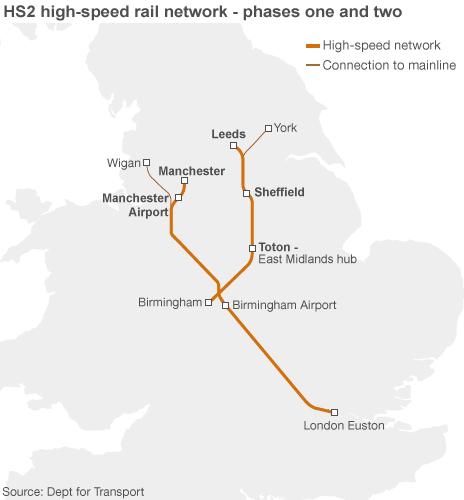
- Published24 July 2013
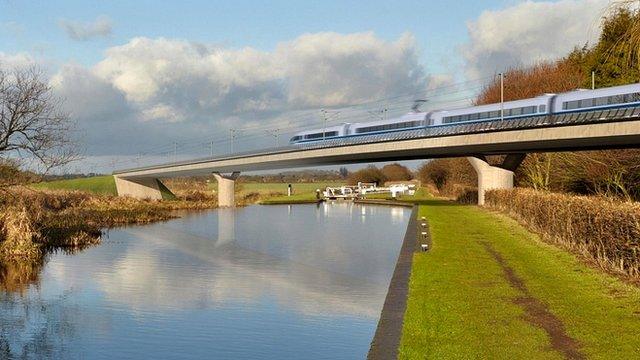
- Published26 June 2013
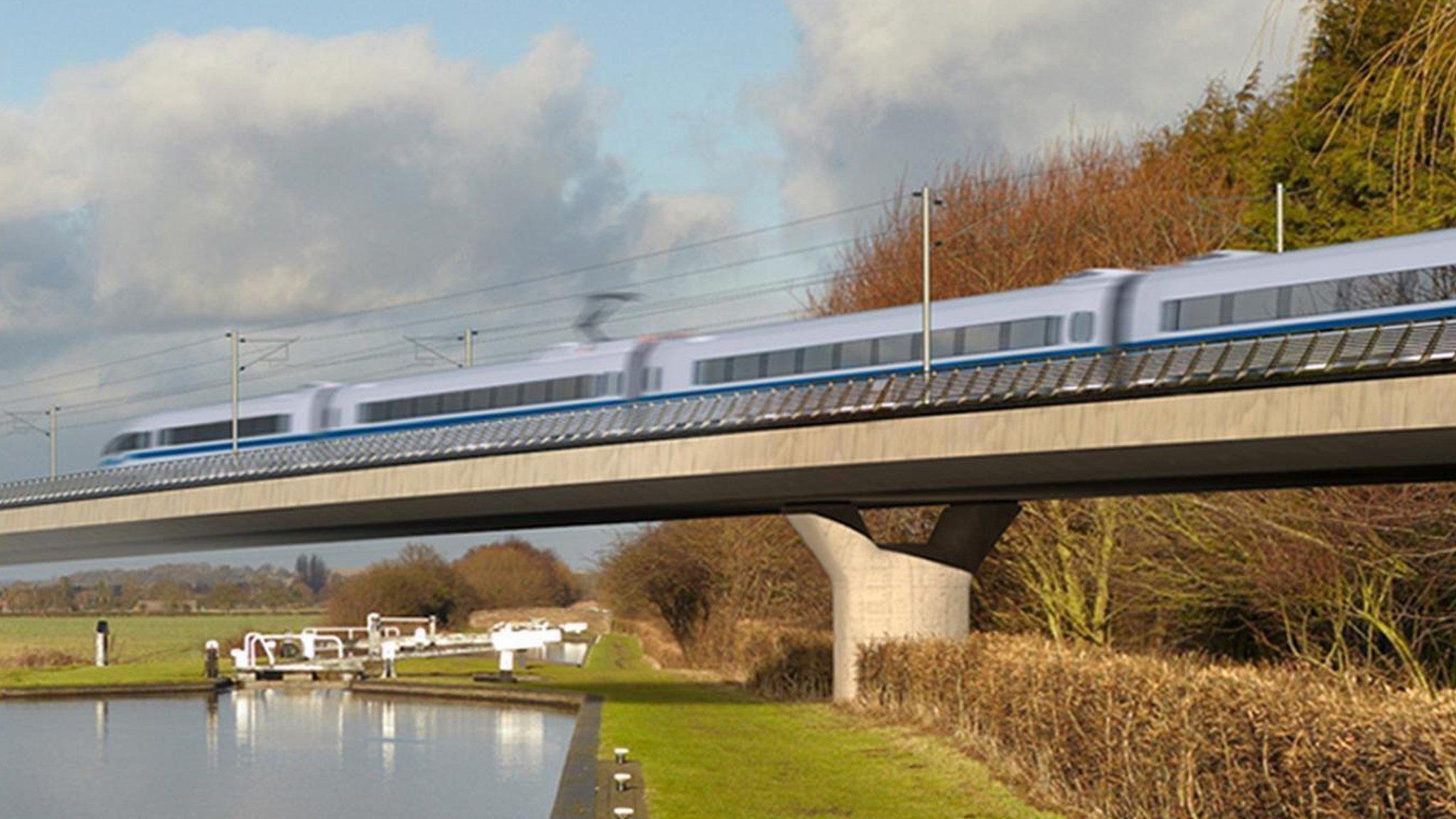
- Published6 October 2023
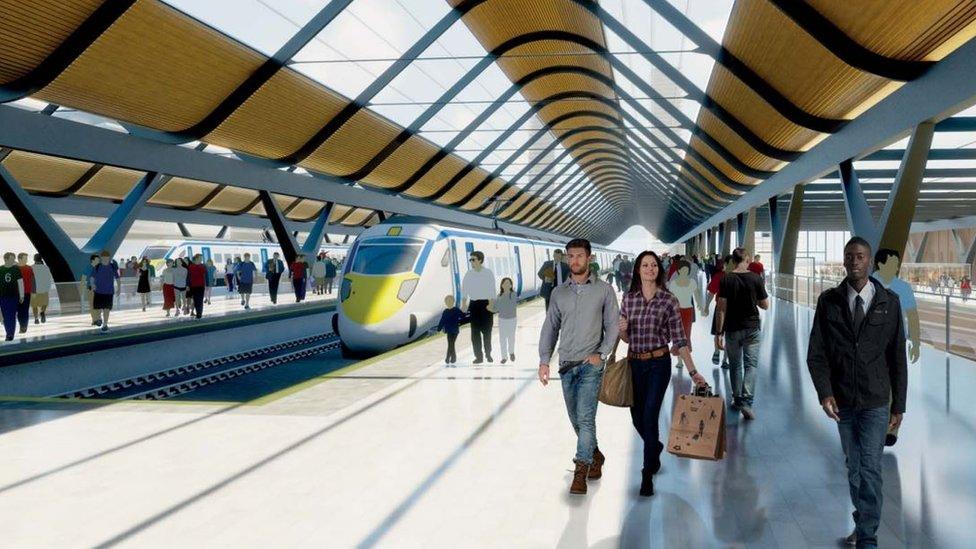
- Published9 July 2013

- Published1 July 2013
